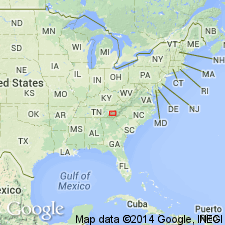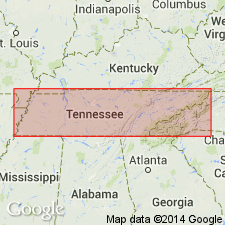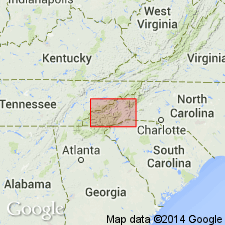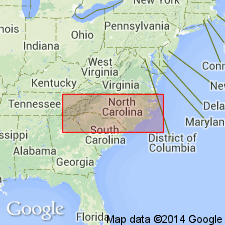
- Usage in publication:
-
- Longarm quartzite*
- Modifications:
-
- Named
- Dominant lithology:
-
- Quartzite
- Sandstone
- AAPG geologic province:
-
- Piedmont-Blue Ridge province
Summary:
Named as formation in Snowbird group of Ocoee series. Named for Longarm Mountain, west of Pigeon River, about 4 mi southeast of Waterville, Haywood Co., western NC. Typically exposed along river at north base of mountain. Covers area in vicinity of Pigeon River and eastward where it projects as ridges of intermediate height. Thins and pinches out southeast of Great Smoky Mountains. Consists of clean, feldspathic, light, medium-bedded, medium- to very coarse-grained quartzite and arkose. Darker, fine-grained sandstone in beds 1 to 3 ft thick is interbedded with quartzite and arkose in upper part. Displays current bedding. Thickness is 5,000 ft at type locality. Contact with underlying Wading Branch formation in conformable and abrupt; interbeds with overlying Roaring Fork sandstone. Report includes correlation chart and geologic map. Age is later Precambrian.
Source: GNU records (USGS DDS-6; Reston GNULEX).

- Usage in publication:
-
- Longarm Quartzite
- Modifications:
-
- Overview
- AAPG geologic province:
-
- Appalachian basin
Summary:
In Unaka Mountains, used as Precambrian Longarm Quartzite of Snowbird Group of Ocoee Supergroup.
Source: GNU records (USGS DDS-6; Reston GNULEX).

- Usage in publication:
-
- Longarm Quartzite*
- Modifications:
-
- Areal extent
- Overview
- AAPG geologic province:
-
- Appalachian basin
- Piedmont-Blue Ridge province
Summary:
Included in Snowbird Group of Ocoee Series. Mapped in Blue Ridge belt northwest of Greenbrier-Devils Fork fault in Cocke and Green Cos., eastern TN, and in Haywood and Madison Cos., northwestern NC. Consists of light-colored, thin- to thick-bedded, generally cross-bedded, medium to coarse, feldspathic quartzite grading to arkose; variably interbedded with darker, thin-bedded, feldspathic quartz-mica schist; locally contains quartz and microcline pebbles. Southeast of Greenbrier-Devils Fork fault, mapped together with Roaring Fork Sandstone and Wading Branch Formation, both of Snowbird Group, in Swain and Haywood Cos., NC. Combined units consist of mostly light-colored feldspathic quartzite or metasandstone and interbedded dark quartz-feldspar-mica schist; contains basal unit of micaceous phyllite or schist with rare quartz-pebble conglomerate. Age is late Precambrian.
Source: GNU records (USGS DDS-6; Reston GNULEX).

- Usage in publication:
-
- Longarm Quartzite
- Modifications:
-
- Overview
- AAPG geologic province:
-
- Piedmont-Blue Ridge province
Summary:
In Blue Ridge belt, used as Late Proterozoic Longarm Quartzite of Snowbird Group of Ocoee Supergroup.
Source: GNU records (USGS DDS-6; Reston GNULEX).
For more information, please contact Nancy Stamm, Geologic Names Committee Secretary.
Asterisk (*) indicates published by U.S. Geological Survey authors.
"No current usage" (†) implies that a name has been abandoned or has fallen into disuse. Former usage and, if known, replacement name given in parentheses ( ).
Slash (/) indicates name conflicts with nomenclatural guidelines (CSN, 1933; ACSN, 1961, 1970; NACSN, 1983, 2005, 2021). May be explained within brackets ([ ]).

